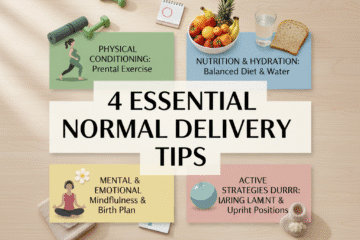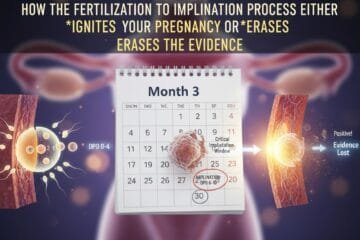
Early 7 DPO Symptoms: The Definitive Guide to Your Two-Week Wait
The Heart of the Two-Week Wait – Understanding 7 DPO
For anyone on the trying-to-conceive (TTC) journey, the period after ovulation, often called the two-week wait, is filled with heightened anticipation and intense scrutiny of every bodily change. As you reach 7 Days Post Ovulation (7 DPO), you are deep in this crucial phase. This marks a significant point because 7 DPO falls right in the middle of the most common implantation window. Many individuals eagerly search for Early 7 DPO Symptoms, hoping for the first genuine sign that conception has led to a successful implantation. The emotional weight attached to these potential signs can be immense.
It’s vital to grasp the scientific processes occurring at this precise moment. By 7 DPO, if fertilization occurred, the fertilized egg has transformed into a blastocyst. This microscopic cluster of cells has usually arrived in the uterus and is now actively seeking to implant into the uterine lining. Implantation—the process where the blastocyst attaches to the uterine wall—typically happens between 6 and 12 DPO, with days 8, 9, or 10 DPO being the most common. Thus, at 7 DPO, implantation might be happening, could have just happened, or could be just around the corner. This makes any 7 DPO symptoms particularly intriguing, as they could potentially be related to this pivotal event.
However, a critical distinction remains: even if implantation occurs at 7 DPO, your body has only just begun (or is about to begin) producing the pregnancy hormone, hCG. This means that while some symptoms could be related to implantation, many are still primarily driven by the high levels of progesterone that dominate the luteal phase. Progesterone prepares the uterus for pregnancy, but its widespread effects can mimic many premenstrual syndrome (PMS) symptoms. Therefore, while researching Early 7 DPO Symptoms offers hope, it’s essential to maintain a balanced perspective. A lack of symptoms is completely normal, and a definitive answer awaits a positive pregnancy test after sufficient hCG production. This article will thoroughly explore the common 7 days post ovulation signs and help you navigate this complex, hopeful phase.
What to Look For – Common Early 7 DPO Symptoms
At 7 DPO, your body is a complex interplay of hormones, primarily progesterone, which continues to rise after ovulation. While you might be keenly observing for Early 7 DPO Symptoms specific to pregnancy, it’s important to remember that many sensations can also be attributed to normal menstrual cycle fluctuations or even unrelated factors like stress or diet. However, because implantation is often occurring around this time, some individuals may experience unique signs.
Here’s a detailed look at the most commonly reported physical and emotional sensations at 7 DPO, often considered potential early pregnancy signs:
1. Implantation Cramping and Spotting:
- What it feels like: This is one of the most anticipated Early 7 DPO Symptoms. You might notice very mild, subtle cramping or pelvic twinges. Descriptions vary from a light flutter, a pulling sensation, mild prickles, or a dull ache in the lower abdomen. It is distinctly different and much less intense than typical menstrual cramps.
- Why it happens: If felt, this is believed to be a direct result of the blastocyst burrowing into the uterine lining. This delicate process can cause minor irritation to the uterine wall.
- Implantation Spotting: A small amount of light pink or brownish spotting might occur. This is usually very light, lasts only a day or two, and is not a heavy flow like a period. It’s important to note that only about 25-30% of pregnant women experience implantation bleeding, so its absence doesn’t mean you’re not pregnant.
- Active Voice: You might experience mild implantation cramping.
- Passive Voice: Mild implantation cramping might be experienced by you.
2. Breast Tenderness, Soreness, or Heaviness:
- What it feels like: Your breasts may feel noticeably heavier, fuller, or more sensitive to touch than usual. The nipples might also become more sensitive.
- Why it happens: Elevated progesterone levels, which continue to climb at 7 DPO, are responsible for these changes. Progesterone stimulates blood flow and fluid retention in the mammary glands, causing them to swell and become tender. This is a very common 7 days post ovulation sign that also occurs before menstruation.
3. Fatigue or Unusual Tiredness:
- What it feels like: A pervasive sense of exhaustion or extreme tiredness, even after adequate sleep. You might feel unusually sluggish or find yourself needing naps.
- Why it happens: Progesterone is well-known for its sedative properties. The sustained high levels of this hormone during the luteal phase, especially around 7 DPO, can induce significant drowsiness. This is a common 7 DPO symptom regardless of pregnancy status.
4. Heightened Sense of Smell or Taste Changes:
- What it feels like: Ordinary odors might suddenly become overwhelming or unpleasant. You might also notice a metallic taste in your mouth, or a change in how certain foods taste.
- Why it happens: While progesterone may play a minor role, these symptoms are more strongly associated with the early rise of the hCG hormone. If implantation has just occurred at 7 DPO, very nascent hCG production could begin to cause these subtle shifts, though it’s still relatively early for strong effects.
5. Changes in Vaginal Discharge:
- What it feels like: You might observe an increase in white, creamy, or lotion-like discharge. Some women report feeling unusually “wet.”
- Why it happens: Progesterone causes cervical mucus to thicken and increase in quantity after ovulation, creating a protective plug for the uterus. This is a normal part of the luteal phase cycle, but some interpret a creamy discharge at 7 DPO as a hopeful sign.
6. Mild Headaches:
- What it feels like: Some women report experiencing mild, occasional headaches, which could be dull or throbbing.
- Why it happens: Hormonal fluctuations are a common trigger for headaches. The changes in estrogen and progesterone during the luteal phase can affect blood vessels and neurotransmitters, contributing to head pain.
7. Mood Swings or Heightened Emotional Sensitivity:
- What it feels like: You might feel more irritable, emotional, anxious, or prone to sudden shifts in mood.
- Why it happens: The significant hormonal fluctuations, particularly the sustained rise in progesterone, can impact brain chemistry, leading to these emotional changes. This is very similar to premenstrual syndrome (PMS).
It is crucial to remember that while these are common Early 7 DPO Symptoms, they are not definitive proof of pregnancy. Many of these signs can be experienced during a regular menstrual cycle. The most accurate confirmation will come from a positive pregnancy test, taken after enough hCG has built up in your system.
The Science of Implantation at 7 DPO
Understanding the intricate scientific processes at 7 DPO is key to interpreting any perceived Early 7 DPO Symptoms. This day is particularly significant because it falls squarely within the most common window for implantation.
The Blastocyst’s Journey:
By 7 DPO, if fertilization was successful, the developing embryo is a blastocyst. It has completed its journey through the fallopian tube and has reached the uterine cavity. The next critical step is for this blastocyst to “hatch” from its protective outer shell and then attach to the prepared uterine lining. This attachment marks the beginning of implantation. The uterine lining, thickened and enriched by progesterone, is now receptive to the blastocyst.
Implantation and hCG Production:
Once the blastocyst successfully implants, your body begins to produce Human Chorionic Gonadotropin (hCG). This is the hormone that home pregnancy tests (HPTs) detect. hCG plays a crucial role by signaling the corpus luteum (the remnant of the follicle that released the egg) to continue producing progesterone. Without this hCG signal, the corpus luteum would degenerate, progesterone levels would drop, and menstruation would begin.
Why 7 DPO Symptoms are Still Primarily Progesterone-Driven:
Even if implantation occurs exactly at 7 DPO, the amount of hCG produced on that first day is minuscule. It takes time for hCG levels to rise sufficiently to cause noticeable symptoms or to be detected by even the most sensitive HPTs. Therefore, while the potential for implantation-related symptoms exists at 7 DPO (like very faint cramping or spotting), the majority of the 7 DPO symptoms you might feel—such as breast tenderness, fatigue, and mood changes—are still predominantly due to the high levels of progesterone. This is why these early pregnancy signs often feel so similar to PMS.
Managing the Two-Week Wait at 7 DPO

The two-week wait can be an emotional rollercoaster, and at 7 DPO, you’re right in the thick of it. Managing your emotions and taking care of your physical well-being is paramount. Trying to dissect every single sensation for Early 7 DPO Symptoms can lead to increased stress, which is not beneficial for anyone trying to conceive.
Strategies for Emotional Well-being:
- Practice Mindfulness: Engage in activities that keep you present and reduce overthinking. Meditation, deep breathing exercises, or gentle yoga can be incredibly helpful.
- Distraction is Your Friend: Immerse yourself in hobbies, watch movies, read books, or spend time with loved ones doing enjoyable activities. Distracting your mind from constant symptom-spotting can significantly reduce anxiety.
- Lean on Your Support System: Talk to your partner, a trusted friend, or a family member who understands your journey. Sharing your feelings can lighten the emotional load. If you’re struggling, consider joining an online TTC community for shared experiences.
- Limit “Google Searches”: While it’s natural to seek information on 7 DPO symptoms, excessive searching can lead to misinformation and heightened anxiety. Stick to reputable sources and then step away.
Supporting Your Physical Health:
- Continue Prenatal Vitamins: Ensure you are consistently taking your prenatal vitamin, especially one with folic acid, which is crucial for early fetal development.
- Healthy Diet: Maintain a balanced and nutritious diet. Focus on whole foods, adequate protein, and plenty of fruits and vegetables. Avoid processed foods, excessive sugar, and artificial ingredients.
- Stay Hydrated: Drink plenty of water throughout the day. Proper hydration supports all bodily functions and can help with any progesterone-induced constipation.
- Gentle Movement: Continue with light to moderate exercise that you are accustomed to, such as walking, swimming, or prenatal-friendly workouts. Avoid intense new routines or high-impact activities.
- Prioritize Sleep: Get at least 7-9 hours of quality sleep. The high progesterone levels at 7 DPO can make you feel more tired, so listen to your body’s need for rest.
By actively focusing on these strategies, you empower yourself to navigate the uncertainty of 7 DPO with greater calm and patience. Remember, you are doing everything you can, and now it’s a matter of waiting for your body to give a clearer answer.
When to Test for Accuracy & Important Resources
One of the most burning questions during the two-week wait is “When should I take a pregnancy test?” When you’re experiencing Early 7 DPO Symptoms, the temptation to test can be incredibly strong. However, for the most accurate results and to avoid unnecessary disappointment, timing is critical.
The Timing of Pregnancy Testing:
- At 7 DPO: It is far too early to take a pregnancy test. Even if implantation has just occurred, the hCG levels in your system will be negligible and undetectable by home pregnancy tests (HPTs). A negative result at 7 DPO will almost certainly be a false negative, providing no useful information and only increasing anxiety.
- Earliest Recommended Testing: Most “early detection” HPTs recommend testing no earlier than 10-12 DPO. By this point, sufficient time has passed for implantation to occur and for hCG levels to rise to a detectable level.
- Most Accurate Results: For the highest accuracy, it is best to wait until the day of your missed period. By this time, hCG levels are typically high enough for nearly all HPTs to provide a reliable result.
Resist the urge for “pee-on-a-stick” addiction. Testing early can be costly, emotionally draining, and ultimately uninformative at 7 DPO.
When to Contact Your Healthcare Provider:
While most 7 DPO symptoms are normal physiological responses, it’s always wise to be aware of any concerning signs. You should contact your doctor if you experience:
- Heavy, bright red vaginal bleeding that resembles a period.
- Severe, sharp, or persistent abdominal pain that feels unusual or intense.
- Signs of infection, such as fever, chills, or unusual discharge with odor.
- Any symptom that causes you significant distress or worry, or feels genuinely abnormal for your body.
Official and Reliable Resources:
For further trustworthy information on pregnancy, conception, and women’s health, consult these authoritative organizations.
- American College of Obstetricians and Gynecologists (ACOG)
- Centers for Disease Control and Prevention (CDC) – Pregnancy
https://www.cdc.gov/pregnancy/
- National Institutes of Health (NIH) – Pregnancy
https://www.nichd.nih.gov/health/topics/pregnancy
- Planned Parenthood – Pregnancy Tests
https://www.plannedparenthood.org/learn/pregnancy/pregnancy-tests
- Mayo Clinic – Early Pregnancy Symptoms
These resources can empower you with accurate information, helping you to make informed decisions and manage your journey with confidence.
FAQs about Early 7 DPO Symptoms
Here are some frequently asked questions about Early 7 DPO Symptoms to help clarify common concerns during this pivotal stage of the two-week wait.
Q1: Is it possible to be pregnant at 7 DPO? A: Yes, it is biologically possible that fertilization has occurred, and implantation may be happening or has just occurred at 7 DPO. However, you are only clinically considered pregnant once implantation is complete and your body starts producing detectable hCG.
Q2: Can I get a positive pregnancy test at 7 DPO? A: It is extremely rare and highly unlikely. While implantation can occur at 7 DPO, it takes a few days for hCG levels to rise enough to be detected by even the most sensitive home pregnancy tests. A negative test at this stage is almost certainly a false negative.
Q3: Are 7 DPO symptoms reliable indicators of pregnancy? A: No, most 7 DPO symptoms are not reliable indicators of pregnancy. They are primarily caused by the natural rise in progesterone during the luteal phase, which occurs whether you are pregnant or not. Many symptoms are indistinguishable from typical PMS.
Q4: What’s the difference between implantation cramping and regular period cramps at 7 DPO? A: Implantation cramping at 7 DPO is usually very mild, light, and fleeting. It might feel like a flutter or a dull ache. Period cramps, in contrast, are typically more intense, sustained, and often accompanied by a heavier flow of blood that starts around your expected period.
Q5: Should I worry if I have no symptoms at 7 DPO? A: Absolutely not. Many women who go on to have healthy pregnancies experience no noticeable Early 7 DPO Symptoms. A lack of symptoms is completely normal and does not indicate that you are not pregnant.
Q6: What should I do if I experience spotting at 7 DPO? A: Light pink or brown spotting at 7 DPO could potentially be implantation bleeding, but it is not a definitive sign. It could also be due to other factors. If the spotting is heavy, bright red, or accompanied by severe pain, contact your healthcare provider.
Q7: When is the earliest I should take a pregnancy test for a reliable result? A: For more reliable results, wait until at least 10-12 DPO. For the most accurate result, it’s best to wait until the day of your missed period.
Q8: Can stress affect my chances of implantation at 7 DPO? A: While extreme stress can impact overall reproductive health, moderate stress during the two-week wait is unlikely to prevent implantation in a healthy individual. Focus on managing stress through healthy coping mechanisms, rather than worrying about its direct impact on implantation.
Conclusion – Navigating Your Journey with Patience and Hope
The journey through the two-week wait, and especially at the 7 DPO mark, is a profound experience filled with a unique blend of hope, anticipation, and often, a touch of anxiety. The intense scrutiny for Early 7 DPO Symptoms is a natural part of this process, driven by the deep desire for a positive outcome. As we have thoroughly explored, while 7 DPO places you squarely within the implantation window, the vast majority of sensations you might experience are attributable to the normal, powerful hormonal shifts of the luteal phase, primarily driven by progesterone.
It is paramount to temper your expectations and understand that a definitive answer about pregnancy cannot come from symptoms alone, nor from an early pregnancy test at this stage. The most powerful tools you possess during this time are patience, accurate information, and self-compassion. By grasping the scientific realities of implantation and hCG production, you empower yourself to navigate the uncertainty with clarity and peace of mind.
Focus your energy on nurturing your physical and emotional well-being. Continue to prioritize a healthy diet, stay well-hydrated, engage in gentle, familiar forms of exercise, and actively employ stress-reducing strategies. Avoid alcohol, smoking, and the tempting, yet often misleading, early pregnancy test. Trust that your body is working precisely as it should, whether preparing for a new life or resetting for the next cycle.
Regardless of what this specific cycle holds, your dedication to understanding and caring for your body is an invaluable part of your trying-to-conceive journey. Remain hopeful, stay informed, and above all, be exceptionally kind to yourself during this precious time of waiting.










